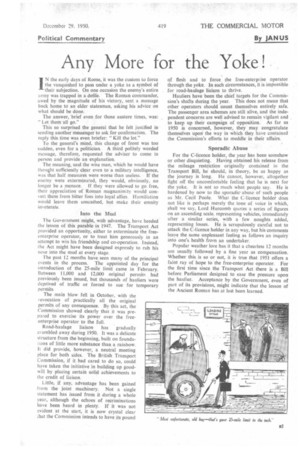Any More for the Yoke!
Page 35

If you've noticed an error in this article please click here to report it so we can fix it.
IN the early days of Rome, it was the custom to force the vanquished to pass under a yoke as a symbol of their subjection. On one occasion the enemy's entire army was trapped in a defile. The Roman commander, awed by the magnitude of his victory, sent a message back home to an elder statesman, asking his advice on what should be done.
The answer, brief even for those austere times, was: " Let them all go."
This so surprised the general that he felt justified in sending another messenger to ask for confirmation. The reply this time was even briefer: " Kill the lot."
To the general's mind, this change of front was too sudden, even for a politician. A third politely worded message, therefore, requested the adviser to come in person and provide an -explanation.
The meaning, said the wise man, which he would have thought sufficiently clear even to a military intelligence, was that half measures were worse than useless. If the enemy were exterminated, they •would, obviously, no longer be a menace. If they were allowed to go free, their appreciation of Roman magnanimity would convert them from bitter foes into loyal allies. Humiliation would leave them unscathed, but make their emnity inveterate.
Into the Mud The Government might, with advantage, have heeded the lesson of this parable in 1947. The Transport Act provided an opportunity, either to exterminate the freeenterprise operator, or to treat him generously in an attempt to win his friendship and co-operation. Instead, the Act might have been designed expressly to rub his nose into the mud at every stage.
The past 12 months have_seen many of the principal events in the process. The appointed day for the introduction of the 25-mile limit came in February. Between 11,000 and 12,000 original permits had previously been issued, but thousands of hauliers were deprived of traffic or forced to sue for temporary perthits The main blow fell in October, with the revocation of practically all the original permits of any consequence. By this act, the Commission showed clearly that it was prepared to exercise its power over the freeenterprise operator to the full.
Road-haulage liaison has gradually crumbled away during 1950. It was a delicate structure from the beginning, built on foundations of little more substance than a rainbow. It did provide, however, a neutral meeting place for both sides. The British Transport Commission, if it had cared to do so, could have taken the initiative in building up goodwill by placing certain solid achievements to the credit of liaison.
Little, if any, advantage has been gained from the joint machinery. Not a single statement has issued from it during a whole year, although the echoes of recriminations have been heard in plenty. If it was not evident at the start, it is now crystal clear that the Commission intends to have its pound of flesh and to force the free-enterprise operator through the yoke. In such circumstances, it is impossible for road-haulage liaison to thrive.
Hauliers have been the chief targets for the Commission's shafts during the year. This does not mean that other operators should count themselves entirely safe. The passenger area schemes are still alive, and the independent concerns are well advised to remain vigilant and to keep up their campaign of opposition. As far as 1950 is concerned, however, they may congratulate themselves upon the way in which they have contained the Commission's efforts to meddle in their affairs, Sporadic Abuse
For the C-licence holder, the year has been somehow or other disquieting. Having obtained his release from the mileage restriction originally contained in the Transport Bill, he should, in theory, be as happy as the journey is long. He cannot, however, altogether fight off the uncomfortable feeling that he is next for the yoke. It is not so much what people say. He is hardened by now to the sporadic. abuse of such people as Mr. Cecil Poole. What the C-licence holdet does not like is perhaps merely the tone of voice in which, shall we say, Lord Hurcomb quotes a series of figures on an ascending scale. representing vehicles, immediately after a similar series, with a few noughts added, representing losses. He is scrupulously careful not to attack the C-licence holder in any way, but his comments leaye the same unpleasant feeling as follows an inquiry into one's health from an undertaker.
Popular weather lore has it that a cheerless 12 months are usually followed by a fine year as compensation. Whether this is so or not, it is true that 1951 offers a faint ray of hope to the free-enterprise operator. For the first time since the Transport Act there is a Bill before Parliament designed to ease the pressure upon the haulier. Acceptance by the Government, even of part of its provisions, might indicate that the lesson of the Ancient Roman has at last been learned.




















































































